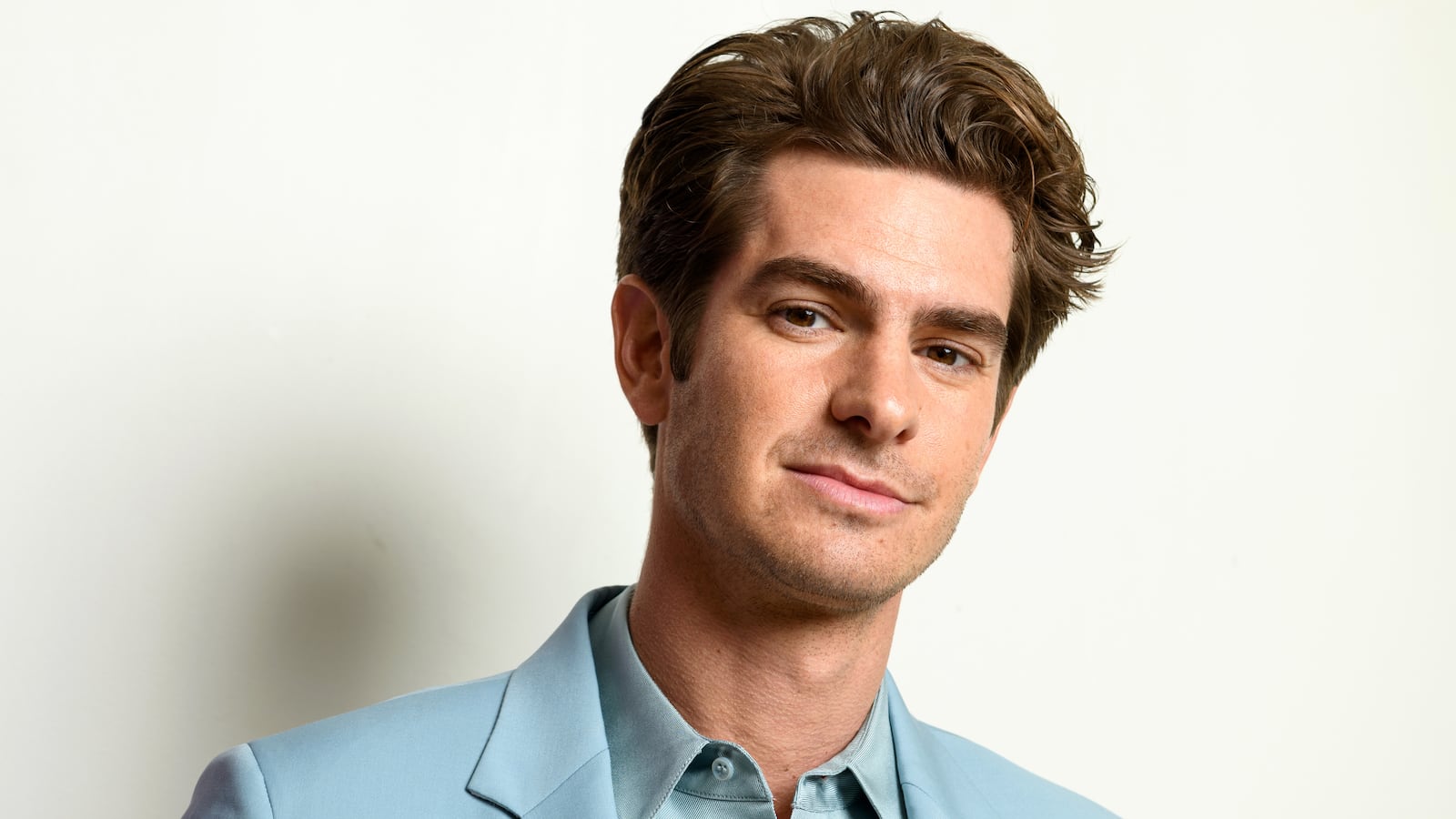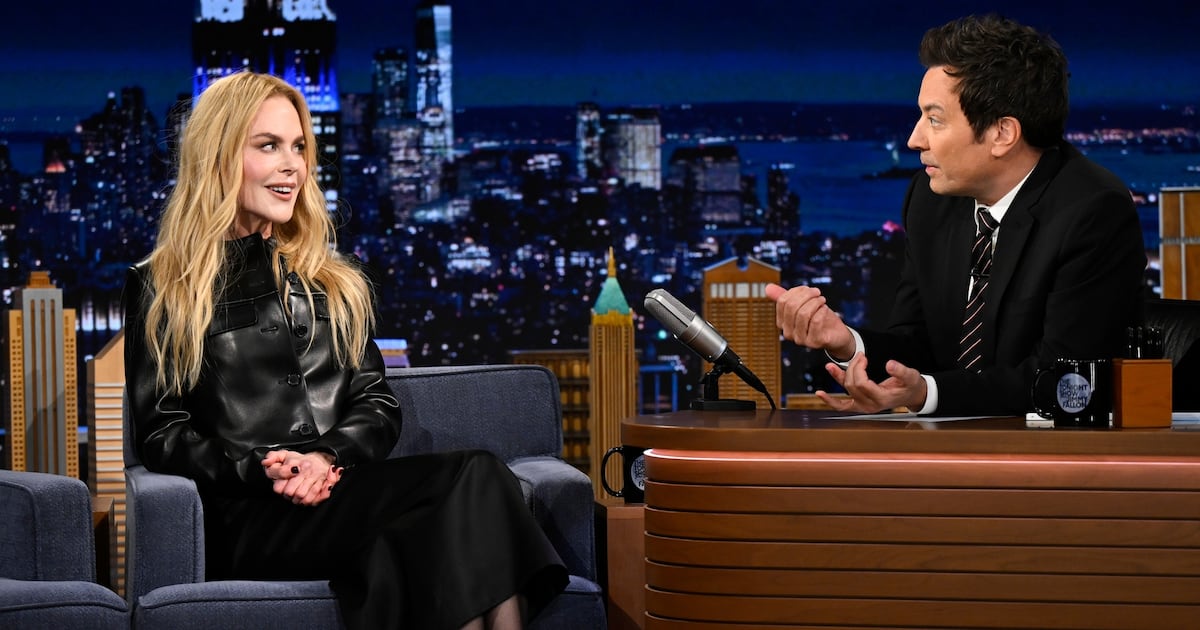Andrew Garfield can preach.
That much was evident when he played Jim Bakker in last year’s The Eyes of Tammy Faye, about the irresistible and ultimately corrupt televangelist and his wife, played by Oscar winner Jessica Chastain. Then in Tick, Tick…Boom!, he starred as musical theater composer Jonathan Larson, who had so much to say about the world through his music that, for a generation of fans, his show Rent remains a religious text.
Now, Garfield is back talking God again in Under the Banner of Heaven, the new FX series based on the book by Jon Krakauer. The series centers on the gruesome 1984 double murder of a mother and daughter that shook a devout Mormon community in Utah, connecting the tragedy back to the founding of the Mormon church by Joseph Smith a century prior.
Jeb Pyre, the local detective played by Garfield, is a fictional character. He is everything you’d expect from a pillar of the community: a good father, supportive husband, and fierce believer in Smith’s teachings. But the violent murders he is investigating and the suspected killers’ insistence that they were committed in the name of God have him in the unfamiliar territory of questioning his own beliefs.
The thing is, even out of character, Garfield preaches too. He delivers a great sermon. He’s a natural at it.
He is so thoughtful and considered about the questions being asked of him, the characters he is playing, and the ways in which his own humanity is changed by the art he is producing that you’re swept away as he speaks.
In the last year, he has played three characters in major projects that are, as Jeb Pyre experiences, having a crisis of faith. In each role, the man Garfield plays encounters something in his life that causes him to doubt his faith and how he perceives the world. Sure, there was a stint in a Spider-Man costume thrown in the middle there, but it’s hard not to look at his recent selection of roles and not see a throughline.
Is there something going on in his life that has him gravitating toward these character arcs? Does Andrew Garfield have a personal connection to this idea of interrogating one’s faith?
Over a Zoom call in the lead-up to Thursday’s premiere of Under the Banner of Heaven, he preaches his answer.
“I think if we’re lucky, that happens over and over and over again, where we get to expand our consciousness,” he says. “The only way we expand our consciousness, expand our hearts, is if they get broken open.”
Transcribed, those words read as woo-woo nonsense. But it is imperative you imagine how passionate Garfield is when he speaks them. He’s not grasping for poignance the way some actors do in their pursuit of pretentiousness. The way he talks about these things is undeniably and irresistibly heartfelt.
The next bit of his speech involves the words “cosmic” and “cataclysmic.” But you need to know that as he says them, it is deeply relatable and accessible.
“I think we probably come into life connected to the everything, without any biases or anything in the way of our kind of cosmic understanding of the laws of nature and the universe,” he says. “And then, gradually, in order to survive, we have to kind of civilize ourselves. We figure out what pleases mummy and daddy, so that we get fed and clothed and have a roof over our heads and then hopefully, as we move away from that, family structure in some way. We figure out that we can survive on our own and then, hopefully, we start to go from a narrow point of view to a much more expanded point of view again. So hopefully by the end of our lives, we’re on our deathbed just going, ‘Wow,’ and we’re back reconnected to the everything.”
As Garfield says these things, you are rapt. You have no choice. He commands your attention. Things that you would normally roll your eyes at and deem ludicrous suddenly become gospel. You’re not aware of how vigorously you’ve been nodding along. The grasp only strengthens when he begins connecting those ideas to what we’ve been experiencing—what he knows you, specifically, have been experiencing—during the pandemic.
“I think in order for that to occur, we need to go through cataclysm,” he says. “And I think it’s happened with the pandemic. I remember at the beginning of the pandemic, I was very hopeful because I was like, ‘Oh my God, maybe this is the cataclysmic global event that will wake everyone up to their own souls and their own deeper needs and yearnings and what actually matters.’ Then of course, six months go by and everyone wants to get back to their usual routine and it’s disappointing.”
Still, he says, the cataclysm—a word I now casually use—happened, even if we didn’t want it to or couldn’t validate it at the time.
“I’ve known a lot of people during this period of time to have made huge changes in their lives, divorces, marriages, babies, a change of job,” he continues. “It’s cataclysmic, and I think it’s healthy and very expansive. So hopefully we’re just constantly going through new cycles of growth and expansion. There’s a pain to it as we grow. It’s painful. It has to be. It has to cost us because we have to let go of the past and we have to embrace a new version of ourselves, I think.”
If you dig into what he’s saying, it’s incredibly profound. You can tell it’s not off-the-cuff speechifying during a press tour. It’s something he’s thought a lot about, and something that grew out of a life experience he had—the way that the roles he’s been playing have interwoven with the circumstances of his own life.
Garfield is coming off a great year, the kind that a celebrity’s publicist could only dream of for their client. He has been the internet’s boyfriend and pop culture’s biggest crush.
Because of the high-profile roles he played and the award season carousel he rode—Tammy Faye was up for numerous awards, and he was Oscar-nominated for his turn in Tick, Tick…Boom!—he has done countless interviews and talk show appearances. And because he was so self-effacing and willing to speak seriously about the themes of his films—not just in canned PR anecdotes—he accomplished the rare celebrity feat of not overstaying his welcome.
By the time he was photographed clutching a hamburger and a drink in one hand at a post-Oscars party, people didn’t just swoon. They wanted more.
I think that’s because for a guy who did something as Hollywood-esque as playing a surprise role in a superhero movie and lying about it, he does come off unabashedly honest. You don’t know him. After our brief Zoom conversation, I still certainly don’t. But he is willing to talk about things in a way that feels personal and not performative.
It’s telling that his viral moment during this past year of being Extremely Everywhere wasn’t while singing karaoke with a TV host or participating in some TikTok challenge. It was when he spoke—beautifully—about weathering, surviving, and, most importantly, embracing grief in honor of his late mother.
“I love talking about her, by the way, so if I cry, it’s only a beautiful thing,” he told Stephen Colbert on The Late Show. “This is all the unexpressed love, the grief that will remain with us until we pass because we never get enough time with each other, no matter if someone lives till 60, 15, or 99. So I hope this grief stays with me because it’s all the unexpressed love that I didn’t get to tell her. And I told her every day. We all told her every day. She was the best of us.”
It’s a gorgeous sentiment, and not the kind of thing a celebrity typically talks about on a press tour.
Under the Banner of Heaven invites similarly heavy talking points, which can be awkward in brief interviews with strangers. As his co-star Gil Birmingham explains, it’s not just another splashy true-crime series of the kind that’s become so popular, but one that “involves a realm of people’s belief system and their paradigm about how they see the world and how they operate in it.”
It’s a show that, Garfield says, invites someone to think about and then share deeper thoughts about themselves and their perspectives, as he’s doing. It’s what drew him to the series in the first place.
“It’s very rare that you would have something so thematically epic in something so personal, in such a horrific, violent murder that would have such ramifications on an entire organization,” he says. “I think that is really juicy stuff.”







